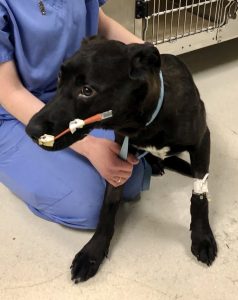Keep Your Pets Safe in the Great Outdoors – Maximus’ Cautionary Tale

Spending a hot summer day fishing on the river with your furry best friend at your side sounds alluring. But if you’re angling to get outside, a black lab named Maximus has a cautionary tale to share.
When Maximus arrived at OHS, he was lethargic, vomiting, and his survival was uncertain. The OHS medical team went to work, looking into every possible cause of his illness. It turns out that Maxiumus was suffering from Salmon Poisoning Disease, a potentially fatal condition seen in dogs that eat certain types of raw fish.
This disease is geographically confined to the Pacific Northwest, so OHS veterinarians knew the disease could be a possibility considering that Maximus had been spending a lot of time in the great outdoors.

How does eating raw salmon lead to a near fatal illness in dogs? The culprit is a parasite that is often seen in raw salmon and other fish that swim upstream to breed. The parasite is usually harmless, but it can contain a dangerous bacteria. This chain of events – a dog being infected with a parasite that is infected with bacteria – is what leads to a critical situation.
Fortunately, Maximus was quickly diagnosed after OHS veterinarians performed a few simple tests. Then, he faced another daunting challenge – the antibiotic he desperately needed was in short supply. But that didn’t stop Dr. Steve Kochis, OHS Chief Medical Officer. “With the great care of the OHS medical team, and our partnerships in the community, we were able to secure the medication Maximus needed and care for him until he made a full recovery,” says Dr. Kochis. “We are very grateful to Dr. Heidi Houchen at Northwest Veterinary Specialists for her help tracking down the appropriate antibiotics.”
Maximus is now enjoying life in a loving home.
With the hot summer weather and our travel plans limited, we are all looking for ways to get outside and have some fun.
Dr. Kochis encourages all pet owners to keep the following advice in mind:
- Make sure your dog is current on flea and tick protection and has been vaccinated for leptospirosis, a dangerous bacteria often found in water.
- Make sure your dog is wearing a secure collar or harness with a current identification. Your pet should also be microchipped in case they get lost. Check to make sure your information linked to the microchip is current.
- Do you know how your dog reacts to bee stings? Pets can also have severe allergies to bees, so consult your vet to see if you should carry medication.
- Always carry a first aid kit that includes bandages, tape, antibacterial ointment and other items. More advice for putting together a pet first aid kit.
- In warmer weather take frequent breaks and provide fresh water, especially if your dog has a long or dark coat.
- Water intoxication can happen if your pet swallows too much water during certain activities like swimming in a lake. Watch out for symptoms like disorientation, vomiting and seizures.
- If you’re going on a hike, make sure it’s appropriate for your dog. Heading into the Gorge? Dog Mountain sounds like the perfect place, but it’s actually one of the most perilous places for you and your pet thanks to an abundance of ticks, poison ivy and rattlesnakes.


